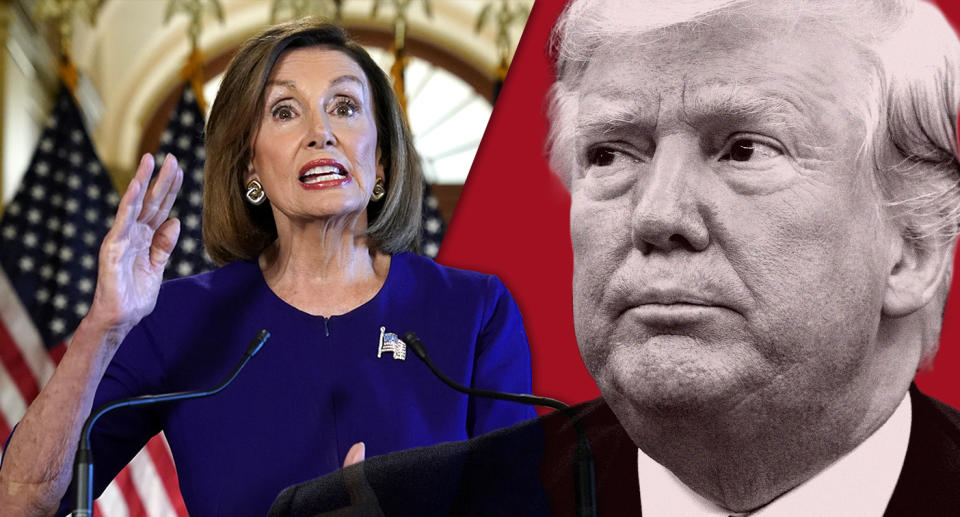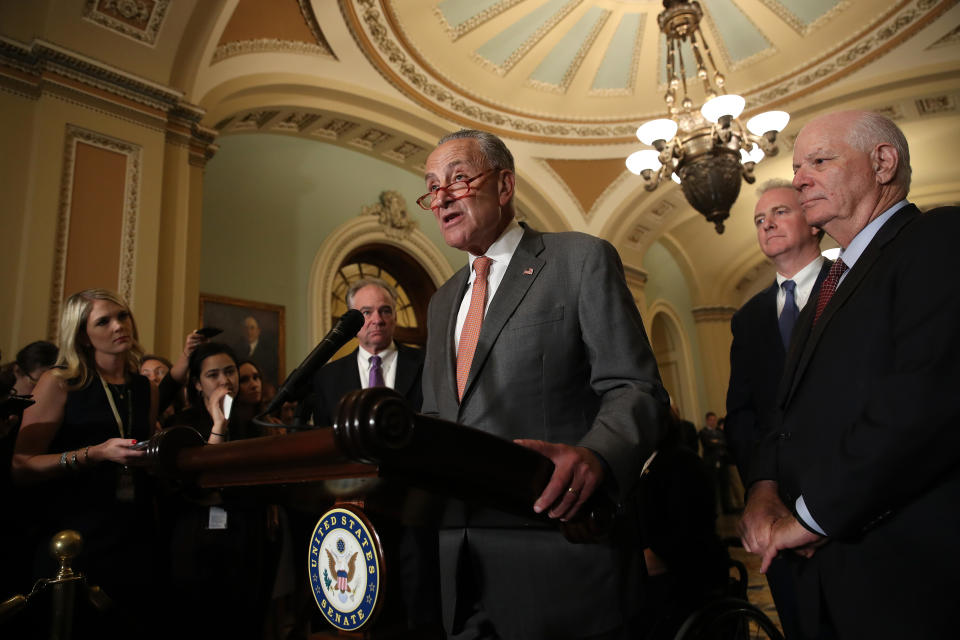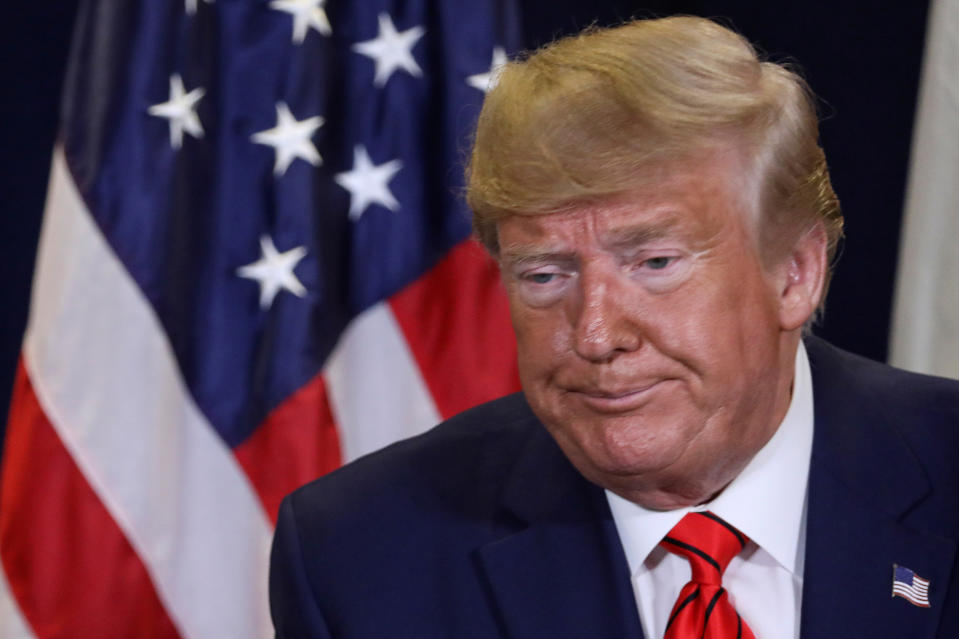Democrats hurtle toward impeachment, but not without friction
WASHINGTON — Donald Trump has survived plenty of scandals as both candidate and president, from the “Access Hollywood” tape, in which he was heard bragging about groping women, to the Russia investigation, which some thought would prove so damaging he would last but a few months in the White House.
But now Trump faces what could be the gravest challenge to his presidency, as House Speaker Nancy Pelosi, D-Calif., announced that she would back a formal impeachment inquiry, something she has resisted doing for months.
“The president must be held accountable,” Pelosi said in a brief address to the nation from Capitol Hill on Tuesday afternoon. She said that six House investigating committees — Intelligence, Oversight, Judiciary, Financial Services, Foreign Affairs, and Ways and Means — would be “moving forward with an official impeachment inquiry.”
The announcement came shortly after Pelosi met with House Democrats. One person who was in the room for that meeting told Yahoo News that there was “no confidence in leadership to do it well.” In particular, that person said some Democrats pushed for the creation of a single select panel to carry out the impeachment investigation.
Pelosi resisted that push, however, in effect leaving the House Judiciary Committee in charge of all impeachment proceedings.
“She said in the meeting that she is telling the chairs [of the five committees other than Judiciary] to pass along relevant information to the Judiciary Committee,” a House staffer told Yahoo News.
That means, the staffer added, that any possible articles of impeachment would originate in the Judiciary Committee before being sent for a vote in the full House.

That approach is how some Democrats have wanted to proceed all along, even as others in the caucus groused about the committee’s chairman, Rep. Jerry Nadler, D-N.Y., whom they saw as ineffectively conducting hearings involving potentially crucial witnesses like former 2016 Trump campaign manager Corey Lewandowski.
“This is an emergency. We don’t have the luxury of time [with] another committee,” tweeted Rep. Alexandria Ocasio-Cortez, D-N.Y.
The creation of a select committee would require considerable time to allocate funding and pick staff, which some members saw as an undesirable delay for a process that is already likely to drift into the heart of a presidential campaign this winter and next spring.
A critical subtext is that progressives in the House also see Nadler — and the Judiciary Committee as a whole — as more progressive than Rep. Adam Schiff, D-Calif., and the Intelligence Committee, one staffer said.
The shift came days after revelations that during a phone call with Ukrainian President Volodymyr Zelensky, Trump asked him to investigate Joe Biden’s son Hunter, a businessman with dealings in the country. The elder Biden is seeking to challenge Trump in the 2020 presidential election, making the request for an investigation a seeming act of political retribution.
As Washington spent a day in the grip of feverish impeachment speculation, Trump was in New York, attending the United Nations General Assembly. Trying to quell the furor over the Ukraine matter, Trump said he would release the full transcript of his phone call with Zelensky on Wednesday.
But that gesture was not enough for Democrats, who insist on seeing a complaint filed by a whistleblower in the intelligence community that first described the allegedly problematic phone call.
“We need the complaint,” Senate Minority Leader Chuck Schumer, D-N.Y., said at a press availability in the U.S. Capitol shortly after Trump announced that he would release the transcript of the phone call. “Simply releasing the transcript is not going to come close to ending the need of the American public and the Congress to see what actually happened.” Late Tuesday evening, White House officials said they were planning to release the whistleblower’s complaint as well as the Inspector General’s report on it by the end of the week.
The Senate later voted unanimously, with the support of Majority Leader Mitch McConnell, R-Ky., for a resolution calling for the whistleblower complaint to be turned over to the intelligence committees of Congress. At the same time, Senate Intelligence Committee Chairman Richard Burr, R-N.C., and Vice Chairman Sen. Mark Warner, D-Va., sent a letter seeking a closed-door interview on Friday with the whistleblower.

Since the complaint was first reported last week, a growing number of Democrats have come to conclude that the best way for the party to proceed is through a formal impeachment inquiry in the House of Representatives.
By Tuesday afternoon, Pelosi, who had long resisted calls from those seeking the start of impeachment hearings, had assented with that course of action.
“The actions taken to date by the president have seriously violated the Constitution,” Pelosi said.
Her address to her colleagues was short on soaring rhetoric and specifics, but it convinced some of the most ardent supporters of impeachment that she was now fully committed.
“The difference is everybody is truly onboard,” said Rep. Pramila Jayapal, D-Wash.
Rep. Gerry Connolly, D-Va., agreed that impeachment now “has an imprimatur ... it didn’t before” because of Pelosi’s comments.
Despite that apparent unity, confusion remains over what substantively had changed about the party’s approach to holding Trump accountable, and Connolly acknowledged that House Democrats in their meeting “didn’t discuss a timeline.”
But Jayapal was confident that, as she put it, “it’s going to be quick.”
Quick is relative, however, as Congress is scheduled to begin a two-week recess on Friday. Multiple top Democratic aides said that they expected at least some of the relevant committees to continue working on the impeachment investigation during that period.
In particular, Schiff’s Intelligence Committee could press ahead with the whistleblower complaint regarding Ukraine and deliver the results of its work to the Judiciary Committee potentially as soon as the House is back in session.
Earlier in the day, while being interviewed by the Atlantic’s Jeffrey Goldberg, Pelosi reminded Trump that the United States was “not a monarchy,” a pointed reference to what critics see as his authoritarian impulses. “It’s really sad to think that a president would perform an impeachable offense,” Pelosi said a little later. “It’s hard to say we’ve gotten to that place. But what would be an impeachable offense would be that which is proven in an investigation. You have to have an investigation.”
She suggested to Goldberg that Trump’s phone call with Zelensky had pushed momentum for impeachment into new territory, in part because it is a less sprawling and confusing allegation than the accusations of collusion with the Russian government that were investigated by special counsel Robert Mueller.
“We have many other candidates for impeachable offense,” Pelosi said. “But this one is the most understandable by the public.”
Calls for a thorough investigation have marked Pelosi’s approach to impeachment, which she believes requires an “ironclad” case against Trump.
But that caution has come to frustrate a growing number of Democrats. “Time is not our friend here,” Rep. Jared Huffman, D-Calif., told Yahoo News. House leadership’s methodical approach, he said, was “not working.”

It was a desire to placate impeachment-hungry members of her caucus that brought Pelosi to a basement meeting room in a House office building on Tuesday afternoon, where she met with the Democratic conference and, right after that, addressed the nation.
Ahead of Pelosi’s announcement, Trump seemed to welcome impeachment proceedings, calling that possibility “a positive for me in the election.” He said that he was the victim of “the worst witch hunt in political history,” a phrase he frequently used to describe Mueller’s investigation into Russian electoral interference in 2016, as well as subsequent obstructive efforts allegedly undertaken by the Trump administration.
“How can you do this,” Trump mused about impeachment, “and you haven’t even seen the phone call?”
Bill Clinton was impeached by the House in 1998 but was not convicted by the Senate. Richard Nixon resigned from office in 1974 as the House prepared to impeach him.
_____
Download the Yahoo News app to customize your experience.
Read more from Yahoo News:
Kavanaugh book authors: 2020 Democrats had a ‘rush to judgment’ on impeachment after NYT op-ed
Russia carried out a ‘stunning’ breach of FBI communications system
Court revives suit alleging Fox News inflicted ‘emotional torture’ on Seth Rich family
After hours of questioning Lewandowski, Democrats finally land punches



